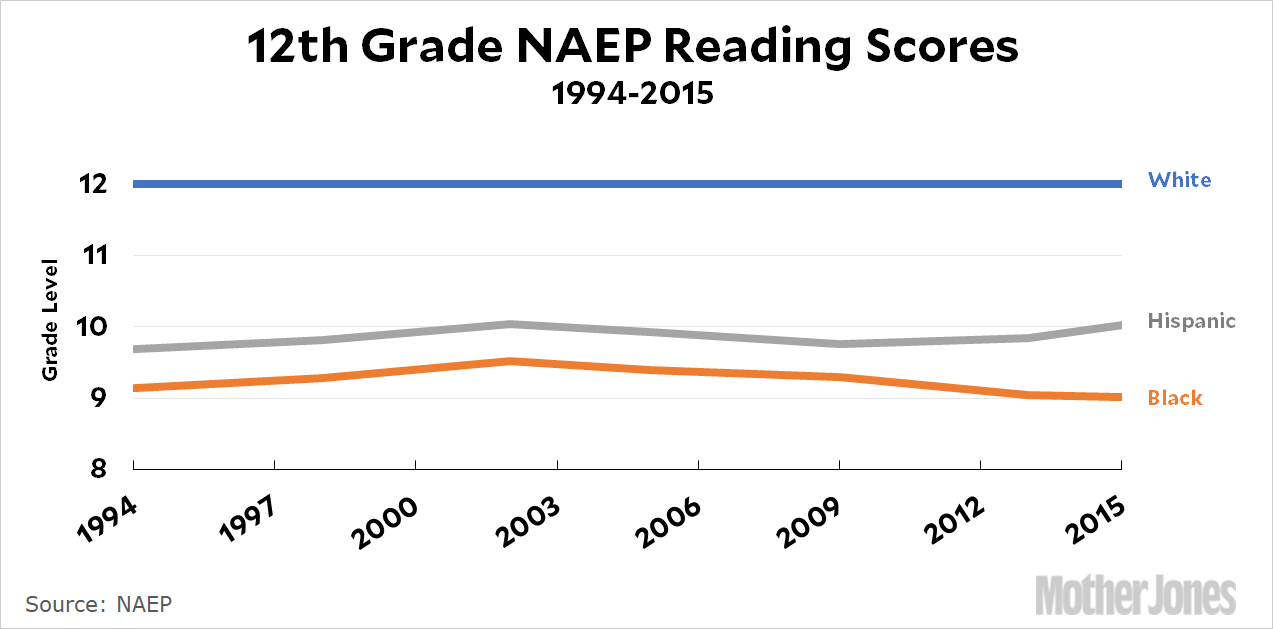Over the weekend I wrote a post about segregation in modern American schools, and it probably seemed like it came out of nowhere. What, if anything, was I responding to?
Nothing, really. It was just a detour from an entirely different post that was originally inspired by Bernie Sanders’ recent speech about charter schools. Long story short, he doesn’t like them. Jon Chait does, and had this to say:
Sanders frames his opposition to charter schools as a blow against segregation. But…neither traditional neighborhood schools nor charters do anything to reduce segregation. What charters do instead is offer poor urban children a better education. And the results at the best models are remarkable. No-excuses charter schools eliminate the achievement gap between white and black children. This is a staggering triumph of progressive social policy that should be spread and emulated.
A new paper by Sarah Cohodes, Elizabeth Setren, and Christopher R. Walters studies the charter sector in Boston, which is one of the most successful in the country. The Boston charter system, like many successful charters, presents a clear example for studies, because it has a hard cap on attendance that requires students be admitted by lottery. The lottery gives researchers a chance to measure the difference in results between students who win and get to enroll in a charter, and those who don’t. The charters do a far better job than the neighborhood Boston schools.
The link in Chait’s piece goes to a post about Success Academy, a famous system of charter schools in New York City run by Eva Moskowitz. (Which, by the way, isn’t a “no-excuses” charter.) And it’s true that Success Academy has been, well, very successful. Their kids score far better than similar kids on standardized tests, and the line of applicants to get in goes around the block three or four times.
Now, I’m a semi-fan of charters. The best of them seem to work pretty well, and I like the idea of allowing schools to experiment with different methods to see what works best. On the other hand, I’m also a longtime skeptic of whether they can scale up, since nearly all of them seem to depend on a steady supply of young teachers willing to work 70-hour weeks. There aren’t enough teachers like that to fill all the schools in America. There are also questions about whether they hound out students with behavior problems, traumatize students with Victorian-era discipline, and teach so rigorously to standardized tests that students are helpless when they leave school and have to start thinking independently. It’s also worth wondering if the gains from charter schools—which are mostly elementary and middle schools—wash out by the end of high school. These are all legitimate questions, and there are no simple answers to them.
But put all that aside. On some level, the best charters really do work, for almost any definition of “work” that makes sense. But do they “eliminate the achievement gap” between black and white children?

The effect of charters on this gap is tricky. Here’s the thing: the lottery that Chait mentions makes charters a dream for researchers. The usual problem when you’re testing different educational systems is that you can never be sure that two different groups of students really are the same. Maybe one group does better than the other for reasons having nothing to do with school. Maybe it’s income or geography or the amount of TV they watch.
But with charters we have a lottery. You take a group of, say, a thousand parents, and then you randomly—literally randomly—divide them up. Some get their kids into the charter school and others don’t. Almost by definition, these two groups are likely to be the same to two decimal places,¹ which means that if one does better than the other it’s almost certainly due to differences in schooling. And this, in turn, means that if low-income black kids at Success Academy do as well as (or better than) low-income whites who end up in public schools, the black-white gap has been closed.
But it hasn’t been. That’s because there is a difference between the charter kids and public school kids in general: the charter kids probably aren’t the very lowest performers, and at the very least they have parents who care enough about education to go through the whole process of applying to the charter. If the black charter winners do better than white charter losers, the most you can say is that the school has closed the black-white gap among kids who are at least moderately motivated.
That’s not nothing, not by a long stretch. It’s a huge accomplishment. But it tells us nothing about how well charters do among kids who are at the bottom scholastically and have parents who don’t really care much. My guess is that this is a very large group indeed, and nobody is much interested in them. And even if you are, it’s not as if you can force parents to give a damn.
When somebody invents an educational intervention that closes the black-white gap among all black and white children, then we will have closed the black-white gap. Until then, we should be careful about how much we promise. The best charter schools have done great work, but they haven’t closed the racial achievement gap yet.
¹As an aside, I’ll mention that there actually is at least one difference: the losing group of students is likely to be disappointed and may be more likely to give up just because they lost. I don’t think this is a huge issue, but it probably has at least some impact.













